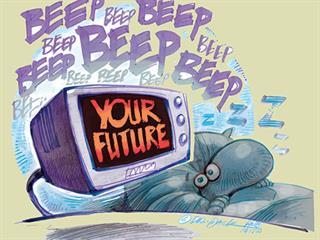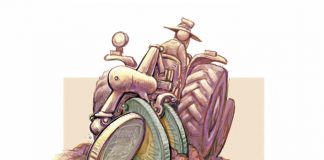
I try to have a liberal perspective of the future, because we live in a liberal democracy, an environment that accepts individual rights, press freedom, economic freedom, and so on. Liberal, in the political context, is virtually a profanity to many black Africans, who see liberals as a caricature of right-wing marketers. This notion is as invalid as the one, coming from more conservative elements such as yourselves, that brands liberals and communists with the same ‘lefty’ mark.
Conservatism itself is accommodated in the liberal democratic Constitution and is not synonymous with racism. Like it or not, we live in a liberal democracy and it’s time we made peace with the idea because it holds up to us a model for the future.
Engaged in a constant balancing act, and often at the mercy of events over which they have no control, farmers are accustomed to pressure. We anxiously wait for the rain to relieve drought and save our crops, or flinch against the possibility of disease, hoping it bypasses our herds. Sometimes the pressure escapes in outbursts of anger vented against government policies.
It is an all-too-human response to default into a comfort zone when the odds seem stacked against us, and as the pressure builds the desire to find this place of protection increases. We should realise the myth even as we understand the response: there is no such place.
Before 1994, the state acted in a ‘nanny’ capacity for white people and things went well for us. Mostly members of the middle class (because we were white), we had good state hospitals and a high standard of education in government schools. We were nurtured by the milk of maternal authority far beyond our weaning date, and thus the muscle and sinew of our anatomy stayed reliant rather than growing resilient. There’s nothing like a forced late weaning to cause loud bellowing, but this is usually followed quickly by acceptance, adaptation and resilience and fitness.
The state will no longer save us. But neither should it; feeding off the state makes for unhealthy parasitism that can end up destroying host and parasite. Bizarrely, though, the government behaves as if it wants to keep the parasite/host relationship going. Weaned now and growing strong, white commercial farmers operate successful businesses in tough competitive markets far from the shelter of the past. Farmers have moved away from politics and have become businessmen. Keep going! You’re doing well.
Land ownership
It’s the black developing farmers and emerging businesspeople who have problems. Forced into a parasitic relationship with government, they are (once again) deprived of title to their land and therefore unable to release the capital that will help them build asset bases. If you’re a white commercial farmer, you can sell your farm to any buyer who can use the land productively; if you are a black developing farmer, your farm is held in a state-controlled trust. No black ownership on farms and no black ownership of RDP houses means no ‘demographic dividend’ with consequent benefits in education, health and economic improvement.
The natural order of the demographic dividend leaves each succeeding generation better off – a powerful motivator for people to perform so that their children ultimately benefit. We are generally better off than our grandfathers were and we hope our children will be better off than we are. While the government denies people the right to own property, it threatens democracy and blocks generational improvement, getting away with a human rights atrocity under our noses.
If it’s important to you to own your farms and houses, then fight for that right for your black countrymen. Fight hard and fight with as much speed as you can muster, because the right to own land will be lost to all South Africans if poor black people are denied ownership. In spite of political uncertainty, people are doing business in agriculture and showing they have the resilience it will take to lift the economy from its current shocking growth of 1,4% and falling.
Mechanisation and technology give farmers a competitive cutting edge, and we cannot allow the government to force us into using so-called cheap labour; it’s a short-sighted ploy without economic sense that will benefit no one. Perhaps there will be fewer commercial farmers as the state and market forces bring more pressure to bear. Success requires capacity and the will to implement economies of scale, a move within the capabilities of many farmers, but outside the scope of others. Don’t get stuck. Make plans. Keep showing the adaptability you have developed. Farm without excuses.
The state is the beneficiary of land reform and until recently Minister Gugile Nkwinti presented us with a moving target that precluded consensus. However, we do notice a degree of rationality lately; the state can be convinced of the value of the market, ownership and individual choice. We need patience and determination to stick with a reasonable and informed approach that will ensure progress even though we may not be quite certain of how it will work.
The value of assets
The micro-business owners of the informal economy are the hardcore capitalists of South Africa, making razor-thin margins and operating in an intensely competitive environment. These people have the skills to do business under the most extreme circumstances; what they lack is capital and assets. If the state were to put land – urban and rural – into the hands of the black South Africans who already live on it, it would provide assets and indirect access to capital.
This would be profoundly empowering. The informal economy would grow, people would buy and sell their properties, some would move from country to city and work in different businesses. So what if they sell rural land to open a spaza shop?
Once the asset is in place, finance can be sought through a bank or stokvel. Why would Minister of Trade and Industry Rob Davies, a communist who drives a million-rand car, dictate that business owners should give 25% of their companies to black shareholders and equity partners, when he could encourage the state to tap into this great reservoir of talent, assets and markets and allow black South Africans to start new businesses? Why indeed? Could it be that Davies is interested only in maintaining his place inside a system that demands increasing authority and power over more and more?
BEE could and should be driven by economic growth. White people should buy minority interests in black businesses, not the other way round. The current philosophy of BEE is detrimental to growth and the maturity of black enterprise development; black South Africans should be granted access to assets and capital, not minority shares in white businesses over which they have little control and in which there is almost no risk. Risk-taking goes to the heart of growth and wealth; it is time to set black entrepreneurship free.
Email Dr Piet Croucamp at [email protected].












